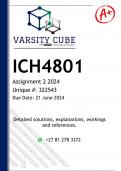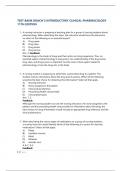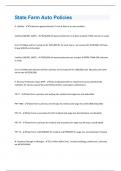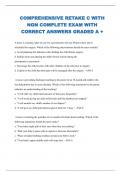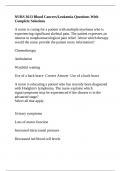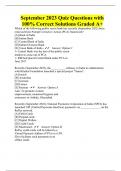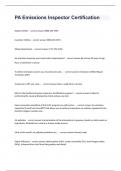Self-concept -> The sum total of beliefs that people have about themselves
- Is made up of Self-schemas: beliefs/memories/generalizations about oneself that guide the
processing of self-relevant information. These can be very domain-specific.
o Our self-concept varies from one occasion to another (if you’re a woman in an all-
male office, you’re more likely to see yourself as a woman)
Aschematic aspects change more over time
- You can be schematic or aschematic on an attribute (regarding an attribute as
extreme/important part of your lives or not)
- Theory of behaviourism -> we learned that behaviour is influenced by socialization
- Cocktail party effect -> Tendency of people to pick a personally relevant stimulus, like a
name, out of a complex and noisy environment.
o When you consider a trait as central to your self-definition, you are likely to have an
elaborate and accessible self-schema about it that contains detailed knowledge
about the trait, and that influences the way you process information about yourself
and others.
The ability to see yourself as a distinct entity in the world may be an necessary first step in the
evolution and development of a self-concept.
Looking-glass self -> Other people serve as a mirror in which we see ourselves. We can often come to
know ourselves by imagining what significant others think of us and then incorporating these
perceptions in our self-concepts.
Self-knowledge is derived from introspection -> a looking inward at one’s own thoughts and feelings.
But it can also impair self-knowledge and it is not everything. People often fail to understand their
own thoughts, feelings and behaviours
- because we are too busy processing information and we overestimate the positives (most
people think they are better than average)
- people also have difficulty projecting forward and predicting how they would feel in response
to future emotional events -> Affective forecasting
o People often overestimate when introspecting the strength and duration of their
emotional reactions -> Impact bias.
Self-perception theory -> The theory that when internal cues are difficult to interpret, people gain
self-insight by observing their own behaviour.
- People only do this when the situation alone seems insufficient to have caused their
behaviour (like through conditional pressure)
- Vicarious self-perception: inferring something about yourself by observing the behaviour of
someone else with whom you completely identify
With introspection it would mean you know yourself better than others do, but with self-perception
that is not the case. Often “internal” and hard to observe traits we know better about ourselves, but
with observable/internal evaluative traits others might even know us better than we do ourselves. So
“knowing yourself” requires a combination of information and objectivity.
Facial feedback hypothesis -> Changes in facial expression can trigger corresponding changes in the
subjective experience of emotion. This also works for body posture.
, - There is a theory that this is due to self-perception, others say it is due to physiological
changes in the brain.
Influences of Other people
Festinger: Social comparison theory -> The theory that people evaluate their own abilities and
opinions by comparing themselves to others
- Change someone’s social surrounding and you can change that person’s spontaneous self-
description.
- Therefore the self is “relative”, a social construct and that each of us defines ourselves in part
by using family members, friends, etc. as a benchmark.
- When: In states of uncertainty, when more objective means of self-evaluation are not
available and sometimes even when it is available.
- With whom: people who are similar to us in relevant ways (like when it is about writing,
comparing to other college students)
- We search for people who are worse than us, to make ourselves feel better.
Two-factor Theory of Emotion -> The theory that the experience of emotion is based on two factors:
physiological arousal and a cognitive interpretation of that arousal.
- Two factors are necessary to feel a specific emotion: the person must experience the
symptoms of physiological arousal -racing heart, rapid breathing, etc.-. Secondly, the person
must make a cognitive interpretation that explains the source of the arousal.
- When people are unclear about their own emotional states, they sometimes interpret how
they feel by watching others (think of laughing although you don’t get the joke).
- Physical arousal precedes cognitive interpretation (think of getting your period)
Social identity theory -> Our brain have evolved to be social and able to interact in social
environment, our self-worth comes from identification with a group.
How do we define ourselves in different situations?
Working self-concept -> Flexible and depends on diversity of our own self-knowledge. It varies from
occasion to occasion.
- Able to alternate between different selves
- We recruit different memories of how we are and we act in different situations
- Creates a conflict between a static self-schemas and a flexible self.
- So: our self-schema is stable, but at the same time we have multiple working concept that
differ along situations.
- Aschematic traits shift more easily (as you don’t care too much about it).
Autobiographical memory -> memories (are distorted) biased to oneself.
- Flashbulb memories -> Detailed recollections from dramatic events in memory. These
recollections are not necessarily accurate or consistent, but they “feel” special and serve as a
landmark in the biographies that we tell about ourselves. (Once necessary for survival?)
- Autobiographical memory is a vital part of our identity and can be shaped by our identity.
o Most people exaggerate their own role and portray the self in a favourable light
o Our current self-concept colours how we see our past selves (self-concept changes
over time)
,Culture and the Self-Concept
- Cultural perceptions differ in for example individualism (American) and collectivism
(chinese/japanese)
o In sum, individuals with independent selves appear to have more rich and elaborate
representations of the self than other individuals.
o USA: list of global traits (less contextualized), abilities, preferences. Japan: Unnatural
separation between ones identity and one’s social context, they feel compelled to
supplement each response with an appropriate social context -> contextualised
But in a second test: when collectivists are asked a specific question, they
answer global (like Westerners would). Both parts are their true selves, but
it’s a different part of their selves.
When the test was done in English, more easterners would react more
individualistic.
o West: tend to explain other people’s behaviour as through personality/without social
context. Non-western: judge dependent on social context
o Western: view social behaviour as driven by internal, stable dispositions as traits and
attitudes. Easterners: tend to view social behaviour as determined by the individual’s
interpersonal relations, roles, circumstances and cultural environment.
- There is a close link between cultural orientation and conceptions of the self (individualism
causes people to feel more independent and unique, for example)
- Each of us have both personal and collective aspects of the self to draw on – and the part
that comes to mind depends on the situation we are in
- Latino cultures prize the concept of simpatico, which emphasizes expressive displays of
personable charm, graciousness and hospitality. Therefore they describe themselves more
often as such.
Self-Esteem
Self-esteem -> An affective component of the self, consisting of a person’s positive and negative (or
indifferent) self-evaluations.
- It is a state of mind that fluctuates up and down in response to success, failure, social
relations and other life experiences.
- As a general rule, self-esteem stays roughly the same from childhood through old age. Yet for
some people in particular, self-esteem seems to fluctuate in response to daily experiences.
- Why do we need Self-esteem?
o Sociometer Theory: The desire for self-esteem is driven by a more primitive need to
connect with others and gain their approval. As a result of this connection, people
may have evolved a “sociometer” that enables us to detect acceptance and rejection
and then translate these perceptions into high and low self-esteem. In this way, self-
esteem serves as a rough indicator of how we’re doing in the eyes of others.
o Terror Management Theory: Humans cope with the fear of their own death by
constructing worldviews that help to preserve their self-esteem. It is a protective
shield.
o Self-esteem can colour our outlook on life: People with low self-esteem tend to be
uncertain and confused about their identities. This causes greater fluctuations in
moods and behaviour in reaction to events in life.
, - People with high self-esteem tend to be clearer on their view of who they are and are
therefore more schematic (however the exact opposite can be argued).
o High self-esteem can cause people to outperform others in certain aspects (public
speaking, mathematics, social situations, etc.)
- Those with high self-esteem try to maximize self-enhancement, those with low self-esteem
try to minimize self-deflation. Low self-esteem people feel greater shame, often because
they are unable to boost their self-worth. High self-esteem people are willing to take more
risks in order to obtain self-enhancing information.
Self-complexity -> The complexness of a person’s self-concept: less complex self-representations
include a small number of highly interrelated aspects. People with high self-complexity (a large
number of quite distinct aspects) are less vulnerable to stressful events (logically, as you look at
definitions). Low self-complexity may advantage when there is triumph, because it will affect all areas
of self-representation. As a result people with low self-complexity have greater mood swings than
people with high self-complexity.
Self-discrepancy theory -> If there are high or low discrepancies between your actual and ideal
selves (=the kind of person you wish and aspire to be) and ought self (=the kind of person you feel
you should and ought to be) affects how much self-esteem you have (how much depends how much
discrepancies, how important you think it is, how much we focus on it)
- People who focus on ideal self, choose more strategies that focus on seeking positive
outcomes -> promotion goals
- People who focus on ought self (and discrepancies with ideal self) choose more strategies
that focus on avoiding negative outcomes -> prevention goals
Self-awareness theory (The self-awareness trap) -> Self-focused attention leads people to notice
self-discrepancies thereby motivating either (1) an escape from self-awareness or (2) a change in
behaviour. People are not usually self-focused, but certain situation predictably force us to do so.
- Solutions:
o “Shape up” by behaving in ways that reduce our self-discrepancies
o “Ship out” by withdrawing from self-awareness
- Which one they choose depends on whether people think they can reduce their self-
discrepancy and if they’re pleased with the progress they make once they try.
- The more discrepancies there are between who we are and who we want to be, the less self-
esteem.
Private self-consciousness (the I) -> a personality characteristic of individuals who are introspective,
often attending to their own inner states. You listen to an inner voice and try to reduce discrepancies
relative to your own standards.
Public self-consciousness (the Me) -> a personality characteristic of individuals who focus on
themselves as social objects, as seen by others. You try to match your behaviour to socially accepted
norms.
Believing in God can also make you more self-aware.
Self-regulation -> The process by which people control their thoughts, feeling or behaviour in order
to achieve a person or social goals
- We do it all the time so reduce our self-discrepancies


